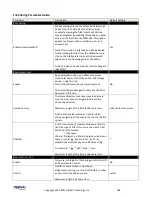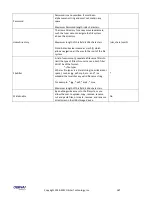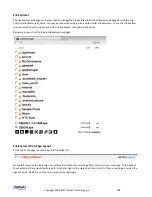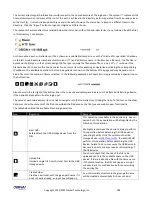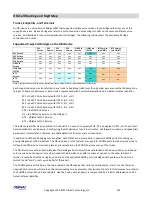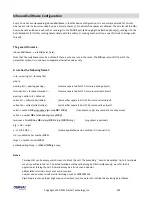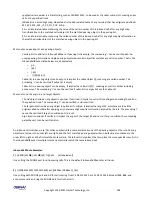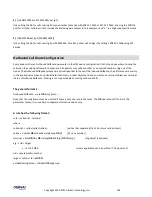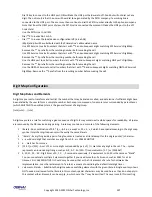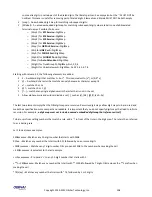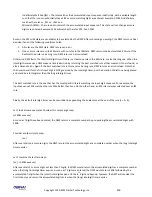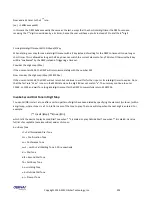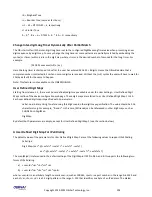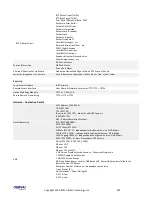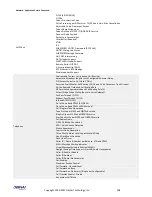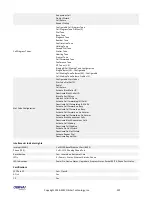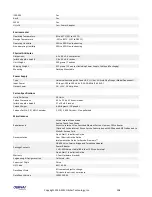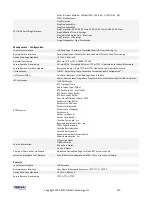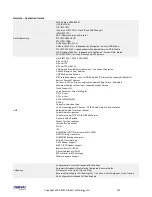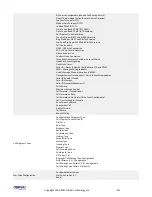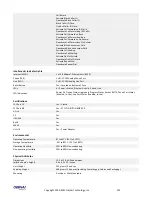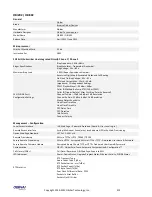
Copyright 2010-2013 Obihai Technology, Inc.
200
-
Indefinitely Matched (IM) – The rule matches the accumulated input sequence indefinitely, with a variable length
such that the rule can potentially stay as IM as more matching digits are entered. Example: 011853 indefinitely
matches the rules xx., 011xx., <011:>xx.
-
Mismatch (MM) – The rule does not match the accumulated input sequence. This state will not change as more
digits are entered. Example: 1234 mismatches the rules 123, 1xx, 12345
Rules in the EM or IM state are candidates to be selected by the DMP. After processing a new digit, the DMP returns a final
decision if any of the following conditions holds:
1.
All rules are the MM state. DMP returns an error
2.
One or more rules are in the EM state with no rules in the IM state. DMP returns the best matched EM rule. If the
best matched rule is a barring rule, DMP returns an error instead
Otherwise, DMP starts the short interdigit timer if there is at least one rule in the EM state, or else the long one. When the
interdigit timer expires, DMP makes a timely decision by returning the best matched rule at that moment if one is found, or
else a timeout error. Again if the best matched rule in this case is a barring rule, DMP returns an error instead. Note that
the timer to wait for the first input digit is NOT governed by the interdigit timer, but the duration of dial tone being played
and could be a lot lengthier than the long interdigit timer.
The best matched rule is the one that has the most specific literals matching the input digit sequence. For example, the
input sequence 1234 matches the rule 123x better than 1xxx. On the other hand, an EM rule is always selected over an IM
rule.
Finally, the default interdigit timer can be overridden by appending the S
n
element at the end of the rule (
n
= 0–9).
Let’s look at some examples. Consider this simple digit map:
(<1408>xxx xxxx)
As soon as 7 digit have been entered, the DMP returns a complete number by pre-pending the accumulated digits with
1408.
Consider another simple map:
(xx.)
After user dials one or more digits, the DMP returns the accumulated digits as a complete number when the long interdigit
timer expires.
Let’s combine the last two maps:
(xx. | <1408>xxx xxxx)
After user dials 1 or more digits but less than 7 digits, the DMP would return the accumulated digits as a complete number
when the (long) interdigit timer expires. As soon as 7 digits are entered, the DMP would return 1408 followed by the
accumulated 7-digit when the (short) interdigit expires. On the 8
th
digit and beyond, however, the DMP will consider the
first rule only and return the accumulated digits as is when the (long) interdigit timer expires.
Summary of Contents for OBi100
Page 54: ...Copyright 2010 2013 Obihai Technology Inc 54...
Page 55: ...Copyright 2010 2013 Obihai Technology Inc 55...
Page 58: ...Copyright 2010 2013 Obihai Technology Inc 58...
Page 75: ...Copyright 2010 2013 Obihai Technology Inc 75...
Page 100: ...Copyright 2010 2013 Obihai Technology Inc 100...
Page 109: ...Copyright 2010 2013 Obihai Technology Inc 109 SP1 SP2 SP3 and SP4 Services...
Page 126: ...Copyright 2010 2013 Obihai Technology Inc 126...
Page 135: ...Copyright 2010 2013 Obihai Technology Inc 135...
Page 140: ...Copyright 2010 2013 Obihai Technology Inc 140...
Page 157: ...Copyright 2010 2013 Obihai Technology Inc 157...
Page 158: ...Copyright 2010 2013 Obihai Technology Inc 158...
Page 159: ...Copyright 2010 2013 Obihai Technology Inc 159...
Page 174: ...Copyright 2010 2013 Obihai Technology Inc 174...
Page 185: ...Copyright 2010 2013 Obihai Technology Inc 185...

